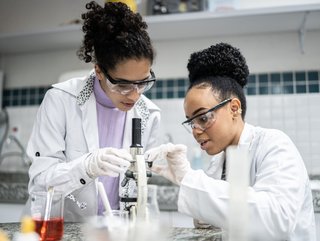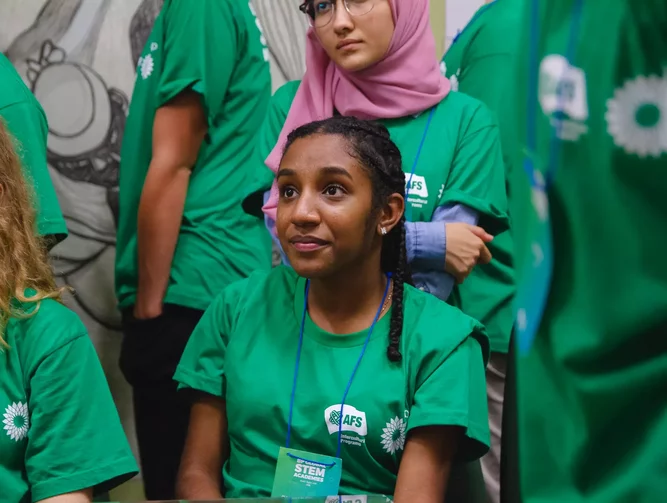Women in STEM – close the gender gap, bridge skills shortage

It’s a truth universally acknowledged that women and girls who seek to advance their STEM education have long faced huge challenges in a field traditionally dominated by men.
And while the past few decades have seen the global community make increased effort in inspiring and engaging women and girls in science, and women have themselves made tremendous progress towards increasing their participation in higher education, they remain under-represented – but even more so in the workplace.
Women are under-represented in STEM, but especially in the workplace
While women make up 47% of the total workforce, they are statistically under-represented in STEM, with less than 30% of the world’s researchers being women, while the share of women CEOs in tech companies is just 10%.
According to the UN, in cutting-edge fields such as Artificial Intelligence, just one in five professionals (22%) is a woman; while women account for just 28% of engineering graduates and 40% of graduates in computer science and informatics.
This number is higher in some countries, like India, where 43% of the total graduates in STEM are women, but then the figure drops drastically with just 14% becoming scientists, engineers, and technologists.
This is an issue worldwide, with much fewer women working in the field than have graduated, proving that support for women in the STEM workplace simply isn’t working.
Hardly surprising when you consider that female researchers tend to have shorter, less well-paid careers and are often passed over for promotion, reports the UN. Or that, when it comes to working in engineering and tech, fields that offer the fastest-growing and highest-paying jobs, an entry-level salary for a man is more than US$4,000 higher than what is paid to a woman with comparable credentials, the US Bureau of Labor Statistic finds.
STEM skills shortage represents huge opportunity – for women and society
This comes as there is increasing demand for STEM skills, and a huge shortage across all technological fields, in particular those technological skills driving Industry 4.0. According to the Bureau of Labor Statistics, the scarcity of engineers in the US will reach 1.2 million by 2026, while demand for software engineers is expected to increase by 22% by 2030.
By supporting and encouraging women into STEM, therefore, not only is the tech talent shortage gap bridged, but women can be lifted out of poorly paid work.
STEM careers tend to be significantly more lucrative than non-STEM jobs, so closing the gender gap in science and tech will help to close the gender gaps in income. On average tech salaries are nearly 80% higher than those for non-tech jobs, Tech Nation’s report reveals.
Initiatives and programs help to provide STEM support and funding
To help close the gender gaps, and improve the future of women in STEM, a collective effort is needed from teachers, industry leaders, society, government, and individuals, to build strong pipelines of women through early mentorship, funding, and reskilling.
Various non-profit and other organisations are also working to provide support, mentorship, funding, and scholarships at different levels and towards different groups, designed to bring more women into STEM.
Among some of the latest Americas-focused initiatives are the IDB Lab’s LAC Women’s Accelerator Program designed to accelerate female-led STEM startups in Latin America and the Caribbean; and the Historically Black Colleges and Universities (HBCU) Pre-Accelerator program, a collaboration between non-profit HBCU Founders Initiative and UNCF TechVentures offering eight-week accelerators for early-stage founders.

AFS Global STEM Accelerator with a focus on refugees
One of the latest initiatives rolled out on a global level focuses on helping to advance girls and women most in need into STEM, including those from low-income households and those who are refugees.
Recognising that recent events has seen the population of refugees soar to 89.3 million, of which nearly one-third (27%) are women and girls under 18, the AFS Global STEM Accelerator – a joint initiative by global non-profit AFS Intercultural Programs and bp – is a full-scholarship, virtual exchange program designed to provide 180 young women worldwide with access to education in sustainability, STEM, and positive social impact.
The program received 1,083 applications from 71 countries, including Afghanistan, Ukraine and Syrian refugees in Turkey, and of the 180 scholarships provided, 20% were refugees, 82% women/girls of colour, and half were from low-income households.
Supporting women to reach great educational heights in STEM
A further initiative, now in its second year, addresses STEM inequality at a higher educational level.
According to data from UNESCO, fewer than 30% of researchers worldwide are women and only 30% of female students select STEM-related fields in higher education. Globally, female students’ enrolment is especially low in ICT (3%), natural science, mathematics, and statistics (5%), and engineering, manufacturing and construction (8%).
To help address this, the British Council runs a scholarship programme in partnership with 26 UK universities with the aim of benefiting women from all over the world, including the Americas, South Asia, Southeast Asia, Egypt, Turkey and Ukraine. It provides women with a scholarship to study a master’s degree, or an early academic fellowship in a STEM program in a leading UK university.
Among other organisations and societies in the Americas offering support, mentorship, scholarships and programs to help advance women and girls are the Association for Women in Science, the National Center for Women & Information Technology, the Society of Women Engineers, and Girls Who Code.
There is also the National Center for Women & Information Technology (NCWIT), a non-profit working to increase the number women in computing and tech fields. They offer programs including the Aspirations in Computing Talent Development Initiative, which offers scholarships and internships.
While the Anita Borg Institute celebrates women who have been successful in technology careers, and offer programs designed to encourage female students to pursue tech careers.
Discover more about the AFS Global STEM Accelerator






